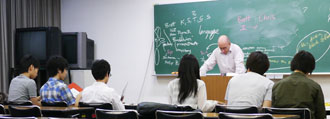- Basic Medical Sciences (April-June, 4 days /week)
6 credit hours - Clinical Sciences (April-June, weekly)
2 credit hours- Practicum in Human Anatomy (3 days)
- Hospital Visit (3 days)
English Conversation (April-March)
A weekly English conversation course held to enhance students’ communication skills.

Academic Presentation (August)


The Academic Presentation course is offered by a lecturer from the University of Groningen Language Centre for two weeks in late August. Through peer review, the students learn how to deliver effective presentations in English. During the latter part of the course, students learn how to effectively answer audience questions following their presentations.
Mini-Retreat (biweekly)
The mini-retreats, informal biweekly meetings, give all students and mentors the opportunity to gather and discuss their research topics.


Interdisciplinary Biomedical Sciences (biweekly)
6 credit hours
This course is taught by the program faculty. It covers the latest topics in immunology, tissue engineering, neuroscience, pharmacology, structural biology, material science, chemical biology, and imaging. Students will be exposed to cutting-edge research topics and techniques in an effort to understand the human diseases in perspectives inclusive of many biological systems. Furthermore, students will study about other topics such as drug toxicity, pharmaceutical administration and regulations, health economics, and intellectual property.
Academic Writing (April-July)
The Academic Writing course is taught both in-class and online by a lecturer from the University of Groningen. Students practice writing reports effectively and appropriately in academic English. There is a tutor who specifically advises on student class summary for the Interdisciplinary Biomedical Sciences.
Internships Abroad (August-September)
2 credit hours
Students will have the opportunity, for example, to intern at the Monterey Institute of International Studies (Monterey, USA) and the GE healthcare R&D (Stockholm, Sweden). The cost of transportation, accommodation and internship related fees will be covered by IPBS. International students will not participate in this course for they join the IPBS in October.
Laboratory Rotation
3 credit hours
Students will be mentored by a specially appointed faculty member in a different research field for a month to get hands on experience in basic interdisciplinary research skills. This course is not required for international students; the rotation may be arranged upon request, however.
Qualifying Examination
After taking most of your IPBS courses including Dissertation I and II, and Laboratory Rotation, you will form a committee to supervise your comprehensive examination which, when successfully completed, leads to your candidacy for the Ph.D. The Qualifying Examination involves writing and defending the dissertation proposal for an original and independent laboratory investigation.
The focus of IPBS from the third year is on dissertation research.
Additionally, students will enroll in the following.
Integrated Biosystems A
5 credit hours
Students will continue working on their dissertation research, applying problem-solving skills to their experiments and maintaining a wide view of the human body function and regulation. Students will continuously receive mentorship from the IPBS junior faculty by holding a regular meeting with them to discuss, for example, how to overcome problems as might occur in the daily experiments and research plan. The course also aims for the students to be able to effectively communicate orally and in writing, particularly, in articulating their research significance and objectives to wide audience.
Integrated Biosystems B
5 credit hours
Students will continue finalizing their dissertation experiments, applying problem-solving skills and maintaining a wide view of the human body function and regulation. Students will continuously receive mentorship from the IPBS junior faculty by holding a regular meeting with them: to discuss how to overcome problems as might occur in the daily experiments, and to learn the manner in which research conduct ought to be. The course also aims for the students to be able to effectively communicate orally and in writing, particularly, in articulating their research significance and objectives to wide audience both in Japanese and English.
IPBS Practicum I.-IV.
In addition to the primary focus on the research hours, students will exercise the following practica.
Practicum I. —Interdisciplinary Research Skills—
This practicum focuses on developing students’ innovative ability in conducting interdisciplinary research. Students will hold research conferences with scientists from different academic backgrounds. Competitive research grants are allocated in promoting student graduate interdisciplinary research.
Practicum II. —Entrepreneurial Skills—
This practicum experience will allow students to develop entrepreneurialship. Students will hold meetings with individuals from enterprises. IPBS-affiliate corporations offer short-term fellowships.
Practicum III. —Global Skills—
Students will work to enhance their global communications and international awareness by organizing international joint symposia and/or participating in lab-based internships overseas.
Practicum IV. —Leadership Skills—
Students will acquire knowledge on leaderships and the way in which leaderships may be achieved through proactive discussions with other students and invited guests.
Progress Report Meetings (quarterly)
All IPBS students are required to attend and they will be joined by specially appointed program faculty and other young researchers at Osaka University. In each meeting, about 20 students will report on their research progress in English using PowerPoint or poster, followed by questions and discussion from the audience.
International Symposium
Students are in charge of organizing and running the symposium. They also select and invite guest speakers.
Seminars by Industry Researchers
These seminars consist of lectures by researchers, policymakers and administrators from industry on their success stories and on how to lead business in pharmaceuticals.